Text
The zine received more submissions than ever, and I've now picked out eight pieces from those I received for issue three of T!. I'm absolutely delighted I'll be able to publish such fabulous work by new and returning contributors. Thank you to all who submitted, it's such a joy to see such diverse and creative responses to the topic.
4 notes
·
View notes
Text

✨SUBMISSIONS OPEN✨
Seeking submissions for Volume 1 Issue 3 of T! - a zine about testosterone.
Full submission guidelines can be found here!
Deadline 4th February 2024.
Open to all - not just testosterone-takers (even cis people)!
While you're there, check out our first two issues.
118 notes
·
View notes
Text
INSIDE ISSUE 2
Just a cheeky glimpse of Simon Ray's Testostertown, a city that celebrates all that's hairy and dick-having.
Find the full piece in the zine here ✨

3 notes
·
View notes
Text
INSIDE ISSUE 2
A taster of Untitled (hair) by Lee Cattarin in T!. A stunning print celebrating one of testosterone's effects on the body.
Find the finished print in the zine here ✨
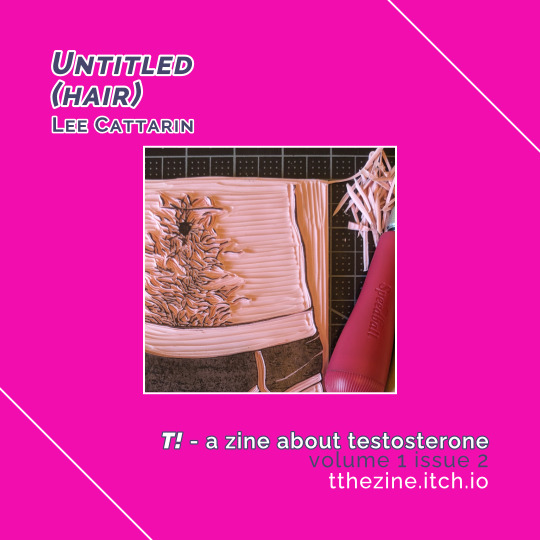
3 notes
·
View notes
Text
INSIDE ISSUE 2
A sneak peak at My voice, testosterone in T!. Follow the journey of a singer starting testosterone.
Find the full zine here ✨
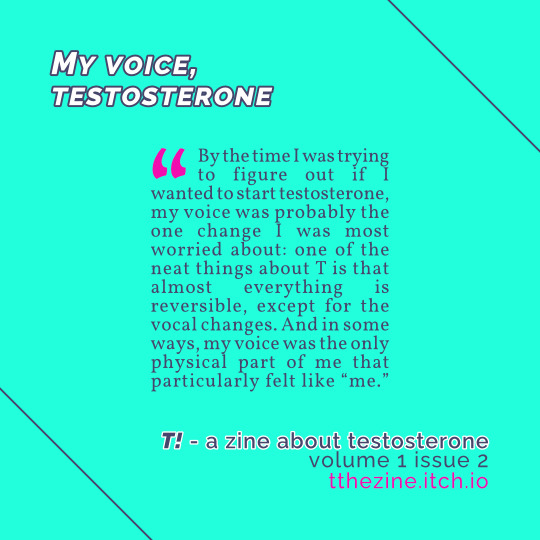

4 notes
·
View notes
Text
Hello from T!
T! is a zine about testosterone - endogenous, exogenous, loved, hated, complicated. We want to bring a fresh perspective on a much-maligned hormone.
We recently released our second issue - available for a price of your choosing, from free. Check it out for poetry, block print, personal essay, collage and digital art, plus other stuff we think you'll love, and a lightly unhinged colour scheme.
You can also read our first issue - with more art, fiction, an essay, a board game and even a recipe.
Check them out, let us know what you think, and watch this space for updates on a third issue ✨
Here's a sneak peek into the second issue to whet your appetite...



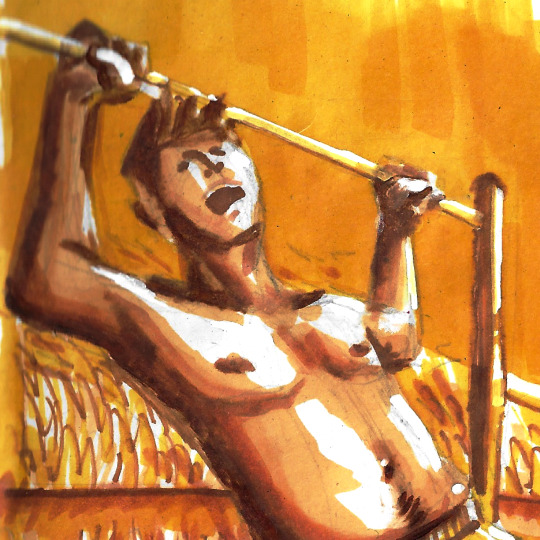
21 notes
·
View notes
Text
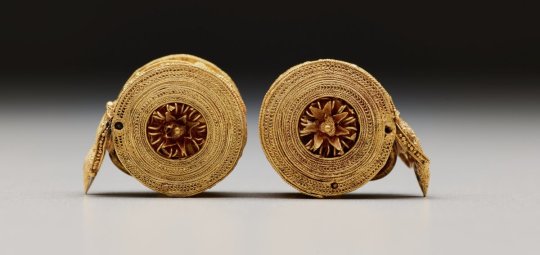
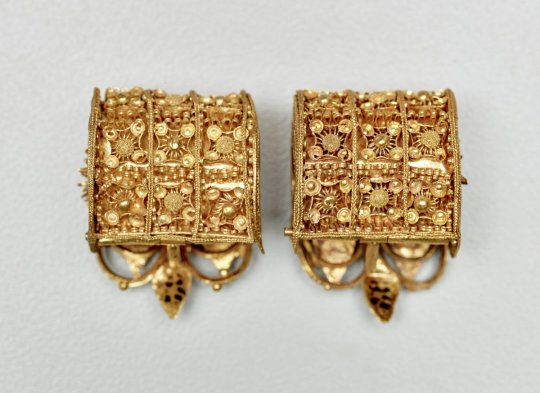
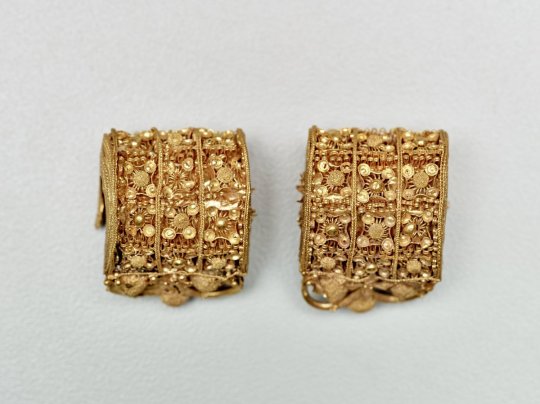
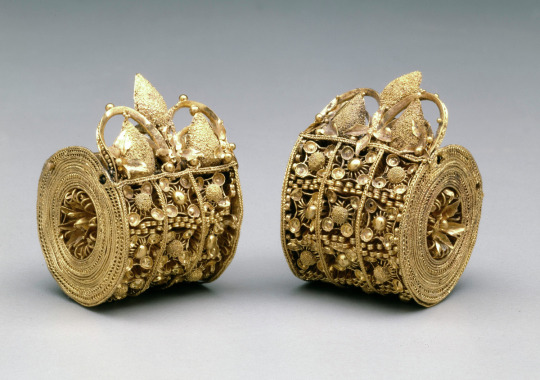
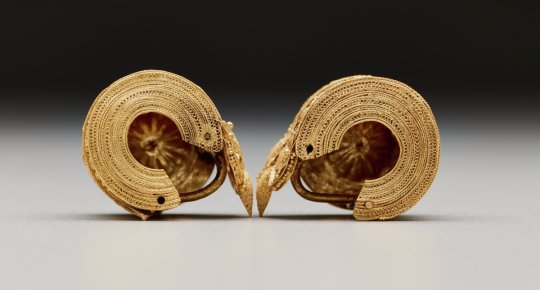
~ Pair of bauletto earrings.
Culture: Etruscan
Date: 6th century B.C.
Medium: Gold
2K notes
·
View notes
Text
You can listen to me speak about Trans Climates on the latest episode of The Multicultural Middle Ages podcast! We discuss trans climatology, anachronism, and more...
In this new article, I discuss some trans ways people thought about the climate in medieval Western Europe.
Attempts to interpret the classical myth of Tiresias's sex change led to the emergence of a strange notion: that the seasons have genders, that the climate is trans.
This article is FREE TO READ, only until October, so read/download it while you can.
Here's the full abstract:

47 notes
·
View notes
Text
This article is free to read for the next three months thanks to the journal Speculum's Scholarship Against Censorship initiative. Here's the journal's statement:

I'm delighted that my article has been included in this selection. In the face of fascist trends, it is imperative to seek out banned books and distribute them. And to continue writing forbidden things, and asking unsettling questions.
See the full post, with links to each article:
In this new article, I discuss some trans ways people thought about the climate in medieval Western Europe.
Attempts to interpret the classical myth of Tiresias's sex change led to the emergence of a strange notion: that the seasons have genders, that the climate is trans.
This article is FREE TO READ, only until October, so read/download it while you can.
Here's the full abstract:

47 notes
·
View notes
Text
In this new article, I discuss some trans ways people thought about the climate in medieval Western Europe.
Attempts to interpret the classical myth of Tiresias's sex change led to the emergence of a strange notion: that the seasons have genders, that the climate is trans.
This article is FREE TO READ, only until October, so read/download it while you can.
Here's the full abstract:

47 notes
·
View notes
Text
In this article, I analyse the nonbinary system of sex difference in a 12th-century medical text, Hildegard of Bingen's Cause et Cure. While studies of intersex in medieval science usually focus on what medieval sources call "hermaphrodites," Hildegard describes types of bodies that she does not call "hermaphrodites," but that are intersex nonetheless. Fallen human bodies are, according to Hildegard, not divided into two sexes, but instead exhibit a diverse array of sex characteristics and gender expressions. Because Hildegard does not make this distinction between "sex characteristics" and "gender expression," her writing illustrates that medieval medicine did not differenciate between "sex" and "gender," but could recognise a nonbinary spectrum of human anatomy and behaviour.
This article is open access so it's free to read, print, frame, distribute, tattoo, etc.
#intersex#trans#medieval medicine#hildegard von bingen#history of medicine#history of sexuality#my work
5 notes
·
View notes
Text
I went straight from undergrad to masters to PhD (in the humanities, in the UK, where "grad school" is different). IMO there are no concrete advantages to going straight into grad school. It worked great for me because I had the funding and I knew exactly where I was going next with my studies. There are no career disadvantages to taking time out of studies, which is why OP's profs are recommending it. Number 1 piece of advice when applying to grad school is look at the funding very closely. Don't take the school's word for it that you'll be "fully funded." Look at the numbers in detail, and get in touch with current students who actually know what it's like. If you can't get full funding, apply somewhere else/wait for another year.
seeking advice from grad students!
i’m so stressed out thinking about grad school… i need to get my permanent residency at some point before my phd but idk if im taking my break to do that before or after my masters. it’ll take 1-2 years to earn my pr, and when my family and i talk about it we’ve settled on post-masters, but when i talk to my profs at school they all encourage me doing my break after undergrad…
i’m really close w one of my profs and today i just had such a skdjsjdjsjf convo w him ab if a break post-masters is a good move. i’m the first in my family to pursue a grad degree and so i have no clue what i’m doing, and i have no idea what the masters to phd pathway looks like…
for anyone in grad school - what does it look like? is it a separate application for phd? or is it kind of a streamlined straight to phd deal? is a break in between a good idea? or should i do my break after my bachelors?
i’m genuinely so daunted by the prospect of doing a break, but i need to get that pr…
i’m pursuing a phd in sociology btw
23 notes
·
View notes
Text

“The Greek vision of the cosmos, from Le Sphere du Monde, 1549, by Oronce Fine.”
66 notes
·
View notes
Text
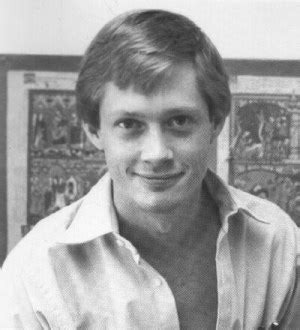
One fun detail I didn't include in the article: along Foucault's fan letter to the historian John Boswell (pictured above), Carolyn Dinshaw found a letter from another of Boswell's fans asking "Do you have a boyfriend? If so, do you see any immediate possibility of dumping him?" while another letter-writer says "I see from... the photo that you are also very hot. Most academics aren't."
My first peer-reviewed publication. In which I discuss the history of sexuality's biggest debate: Essentialism vs Constructionism. Specifically, I discuss what we are doing when we say people from the Middle Ages were "gay." I argue that, for French philosopher Michel Foucault, finding the gay in the Middle Ages means catching a glimpse of a different kind of sex -- relations unlike the ones we are trapped in today.
The article focuses on the relations between Foucault and American medieval historian John Boswell. Boswell, who wrote a transformative book about "Gay People in the Medieval Europe" is usually described as the all-time Essentialist. He thought men who loved men, no matter the era, were Gay. Whereas Foucault is usually described as the all-time Constructionist, the fiercest critic of modern identities like "homosexual."
Indeed, when Boswell's book on "Gay People in the Middle Ages" came out, some readers criticised Boswell for his unrestrained use of the term "gay," and they used Foucault's philosophy as an anti-Essentialist point of reference.
By analysing the later volumes of Foucault's final masterpiece, The History of Sexuality, along with interviews he gave while writing it, I find that Foucault distinguished between "being homosexual" and "being gay." For Foucault, while "homosexual" is a narrow identity inherited from Victorian sexology, "gay" refers to the formation of new sexual relations, a transformative kind of a sexual experience.
And here comes the plot twist: Foucault developed this idea of "gay" while reading... John Boswell! Foucault even wrote a fan letter to Boswell to thank him for his work (Boswell himself wrote a very positive review of The History of Sexuality's later volumes). For Foucault, finding the "gay" in the Middle Ages means experiencing history in a different way, feeling sex otherwise.
The article is François·e Charmaille, "Queer Strategies of Gay History: Boswell's 'Weapons', Foucault's Expérience", Diacritics, 48.4 (2020), 102-121.
47 notes
·
View notes
Text
My first peer-reviewed publication. In which I discuss the history of sexuality's biggest debate: Essentialism vs Constructionism. Specifically, I discuss what we are doing when we say people from the Middle Ages were "gay." I argue that, for French philosopher Michel Foucault, finding the gay in the Middle Ages means catching a glimpse of a different kind of sex -- relations unlike the ones we are trapped in today.
The article focuses on the relations between Foucault and American medieval historian John Boswell. Boswell, who wrote a transformative book about "Gay People in the Medieval Europe" is usually described as the all-time Essentialist. He thought men who loved men, no matter the era, were Gay. Whereas Foucault is usually described as the all-time Constructionist, the fiercest critic of modern identities like "homosexual."
Indeed, when Boswell's book on "Gay People in the Middle Ages" came out, some readers criticised Boswell for his unrestrained use of the term "gay," and they used Foucault's philosophy as an anti-Essentialist point of reference.
By analysing the later volumes of Foucault's final masterpiece, The History of Sexuality, along with interviews he gave while writing it, I find that Foucault distinguished between "being homosexual" and "being gay." For Foucault, while "homosexual" is a narrow identity inherited from Victorian sexology, "gay" refers to the formation of new sexual relations, a transformative kind of a sexual experience.
And here comes the plot twist: Foucault developed this idea of "gay" while reading... John Boswell! Foucault even wrote a fan letter to Boswell to thank him for his work (Boswell himself wrote a very positive review of The History of Sexuality's later volumes). For Foucault, finding the "gay" in the Middle Ages means experiencing history in a different way, feeling sex otherwise.
The article is François·e Charmaille, "Queer Strategies of Gay History: Boswell's 'Weapons', Foucault's Expérience", Diacritics, 48.4 (2020), 102-121.
47 notes
·
View notes
Text
My first peer-reviewed publication. In which I discuss the history of sexuality's biggest debate: Essentialism vs Constructionism. Specifically, I discuss what we are doing when we say people from the Middle Ages were "gay." I argue that, for French philosopher Michel Foucault, finding the gay in the Middle Ages means catching a glimpse of a different kind of sex -- relations unlike the ones we are trapped in today.
The article focuses on the relations between Foucault and American medieval historian John Boswell. Boswell, who wrote a transformative book about "Gay People in the Medieval Europe" is usually described as the all-time Essentialist. He thought men who loved men, no matter the era, were Gay. Whereas Foucault is usually described as the all-time Constructionist, the fiercest critic of modern identities like "homosexual."
Indeed, when Boswell's book on "Gay People in the Middle Ages" came out, some readers criticised Boswell for his unrestrained use of the term "gay," and they used Foucault's philosophy as an anti-Essentialist point of reference.
By analysing the later volumes of Foucault's final masterpiece, The History of Sexuality, along with interviews he gave while writing it, I find that Foucault distinguished between "being homosexual" and "being gay." For Foucault, while "homosexual" is a narrow identity inherited from Victorian sexology, "gay" refers to the formation of new sexual relations, a transformative kind of a sexual experience.
And here comes the plot twist: Foucault developed this idea of "gay" while reading... John Boswell! Foucault even wrote a fan letter to Boswell to thank him for his work (Boswell himself wrote a very positive review of The History of Sexuality's later volumes). For Foucault, finding the "gay" in the Middle Ages means experiencing history in a different way, feeling sex otherwise.
The article is François·e Charmaille, "Queer Strategies of Gay History: Boswell's 'Weapons', Foucault's Expérience", Diacritics, 48.4 (2020), 102-121.
#gay#my work#foucault#john boswell#philosophy#philosophy of history#medieval history#history of sexuality
47 notes
·
View notes
Text
This is easy for me to say because I've never had difficulty making connections but I would tell anyone starting out that (especially if you're on social media) you can just not go to conferences. I'm not going to any this summer and it's great
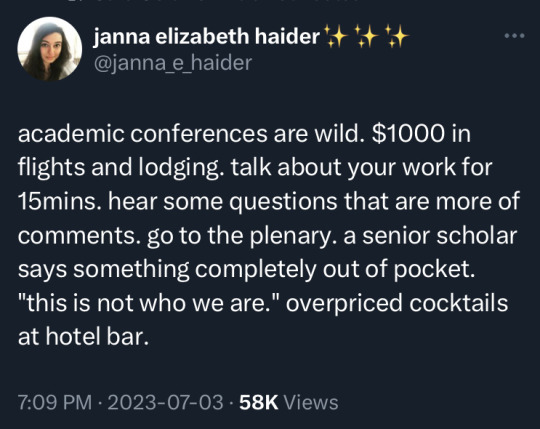
775 notes
·
View notes